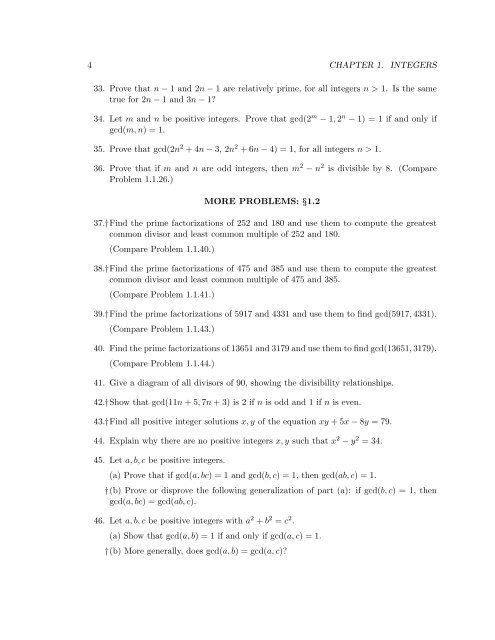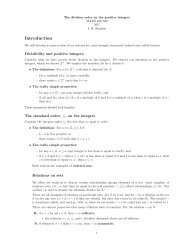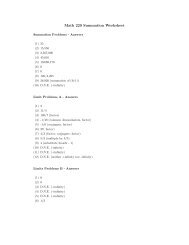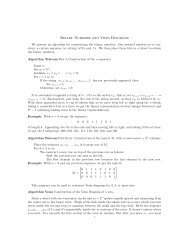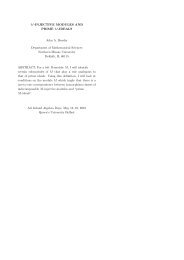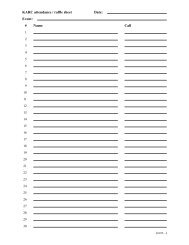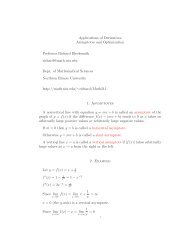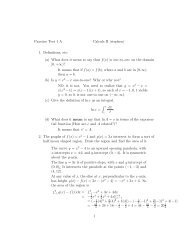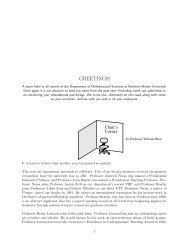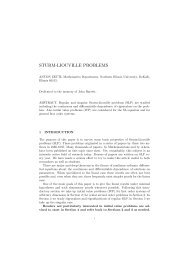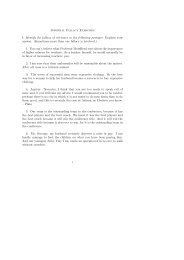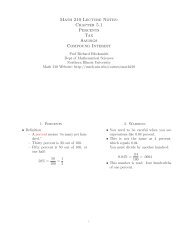abstract algebra: a study guide for beginners - Northern Illinois ...
abstract algebra: a study guide for beginners - Northern Illinois ...
abstract algebra: a study guide for beginners - Northern Illinois ...
You also want an ePaper? Increase the reach of your titles
YUMPU automatically turns print PDFs into web optimized ePapers that Google loves.
4 CHAPTER 1. INTEGERS<br />
33. Prove that n − 1 and 2n − 1 are relatively prime, <strong>for</strong> all integers n > 1. Is the same<br />
true <strong>for</strong> 2n − 1 and 3n − 1?<br />
34. Let m and n be positive integers. Prove that gcd(2 m − 1, 2 n − 1) = 1 if and only if<br />
gcd(m, n) = 1.<br />
35. Prove that gcd(2n 2 + 4n − 3, 2n 2 + 6n − 4) = 1, <strong>for</strong> all integers n > 1.<br />
36. Prove that if m and n are odd integers, then m 2 − n 2 is divisible by 8. (Compare<br />
Problem 1.1.26.)<br />
MORE PROBLEMS: §1.2<br />
37.†Find the prime factorizations of 252 and 180 and use them to compute the greatest<br />
common divisor and least common multiple of 252 and 180.<br />
(Compare Problem 1.1.40.)<br />
38.†Find the prime factorizations of 475 and 385 and use them to compute the greatest<br />
common divisor and least common multiple of 475 and 385.<br />
(Compare Problem 1.1.41.)<br />
39.†Find the prime factorizations of 5917 and 4331 and use them to find gcd(5917, 4331).<br />
(Compare Problem 1.1.43.)<br />
40. Find the prime factorizations of 13651 and 3179 and use them to find gcd(13651, 3179).<br />
(Compare Problem 1.1.44.)<br />
41. Give a diagram of all divisors of 90, showing the divisibility relationships.<br />
42.†Show that gcd(11n + 5, 7n + 3) is 2 if n is odd and 1 if n is even.<br />
43.†Find all positive integer solutions x, y of the equation xy + 5x − 8y = 79.<br />
44. Explain why there are no positive integers x, y such that x 2 − y 2 = 34.<br />
45. Let a, b, c be positive integers.<br />
(a) Prove that if gcd(a, bc) = 1 and gcd(b, c) = 1, then gcd(ab, c) = 1.<br />
†(b) Prove or disprove the following generalization of part (a): if gcd(b, c) = 1, then<br />
gcd(a, bc) = gcd(ab, c).<br />
46. Let a, b, c be positive integers with a 2 + b 2 = c 2 .<br />
(a) Show that gcd(a, b) = 1 if and only if gcd(a, c) = 1.<br />
†(b) More generally, does gcd(a, b) = gcd(a, c)?


